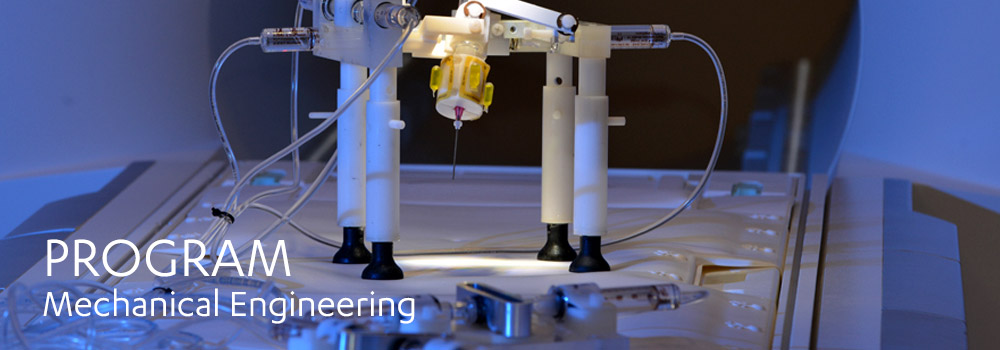
The objective of this program is to provide students with a broad knowledge of the major areas of mechanical engineering in order to fulfill the current and future needs of the industry.
Mechanical Engineering
Degree: Master of Science in Engineering – Mechanical
Area Director: Professor Ajit Mal – ajit@seas.ucla.edu
Program Description: The objective of this program is to provide students with a broad knowledge of the major areas of mechanical engineering in order to fulfill the current and future needs of the industry. The major areas include thermodynamics, heat transfer, fluid mechanics, structural and solid mechanics, dynamics, control, mechanical design, mechanical systems, micro – and nano – electromechanical systems and robotics. Our undergraduate and graduate courses cover a wide range of fundamental concepts and advanced knowledge base in each of these areas. The program prepares students with the educational background and provides them with the skills that are necessary to remain productive in today’s rapidly changing technical environment.
Degree Requirements:
Nine courses are required (36 units), of which five must be MECH&AE (MAE) graduate (200) level courses (excluding ENGR 299 Capstone Project course), and meet Comprehensive Exam Requirement. Courses should be chosen so that graduate level (and breadth requirements, if applicable) are met.
- A minimum of (6) MAE courses are required
- A minimum of (5) MAE courses must be taken at the 200 (graduate) level
Breadth Requirements: Students who do not have a B.S. degree from an ABET-accredited aerospace or mechanical engineering program must take the following two courses:
- MECH&AE 150B – Aerodynamics
- MECH&AE 156A – Advanced Strength of Materials
Students are required to take at least one course from the following list:
- MECH&AE M256A – Linear Elasticity
- MECH&AE M269A – Dynamics of Structures
- MECH&AE M297C – Composites Manufacturing
The remaining courses may be selected from the list below. Select C&EE / MAT SCI courses are also eligible (listed below).
Select a minimum of six courses. Graduate students should not take more than (3) 100-level courses.
- MECH&AE 150B – Aerodynamics
- MECH&AE 156A – Advanced Strength of Materials
- MECH&AE 166C – Design of Composite Structures
- MECH&AE M168 – Introduction to Finite Element Methods
- MECH&AE M183B – Introduction to Microscale and Nanoscale Manufacturing
- MECH&AE 171B – Digital Control of Physical Systems
- MECH&AE C237 – Design and Analysis of Smart Grids
- MECH&AE 250D – Computational Aerodynamics
- MECH&AE M256A – Linear Elasticity
- MECH&AE 256B – Nonlinear Elasticity
- MECH&AE 256F – Analytical Fracture Mechanics
- MECH&AE 263E – Bionic Systems Engineering (projected for Fall 2024)
- MECH&AE M269A – Dynamics of Structures
- MECH&AE M270A – Linear Dynamic Systems
- MECH&AE 270B – Linear Optimal Control
- MECH&AE C294A – Compliant Mechanism Design
- MECH&AE C296A – Mechanical Design for Power Transmission
- MECH&AE C297A – Rapid Prototyping and Manufacturing
- MECH&AE M297C – Composites Manufacturing
- MECH&AE 298 – Advanced Design of Modern Aerospace Structures (Seminar in Engineering)
- C&EE 235A – Advanced Structural Analysis
- C&EE 235B – Finite Element Analysis
- C&EE 233 – Mechanics of Composite Material Structures
- MAT SCI 250B – Advanced Composite Materials
Please visit the Registrar’s webpage for Course Descriptions.
Field Experience:
Not required.
COMPREHENSIVE EXAM REQUIREMENT
Students can meet the Comprehensive Exam Requirement by choosing ONE option below:
Option 1:
Take and Pass ENGR 299 Capstone Project course.
Option 2:
Take and pass three written exams for three different graduate level courses within the student’s area of specialization. The written exams are held concurrently with the final exam of the graduate level courses. Students may select which exams they would like to count towards the Comprehensive Exam requirement.
Electives:
As long as you have met the requirements above, the remaining courses may be selected from other Engineering departments. No approval is necessary. Please note: Students may not apply electives towards earning a certificate. Certificate programs are intended for non-matriculating students and are categorized as separate programs.
Thesis Plan:
NONE
Time-to-Degree:
Students are expected to complete the degree within two academic years and one quarter, including two summer sessions. The maximum time allowed in this program is three academic years (nine quarters), excluding summer sessions.
